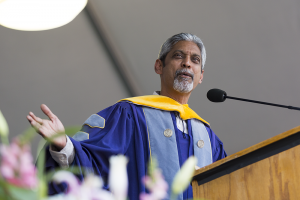
Global mental health expert Vikram Patel spoke about mental health and health inequality in his address to the Class of 2015 at the commencement ceremony for the School of Nursing and Health Studies this afternoon.
University President John J. DeGioia presented Patel with a degree of Doctor of Science prior to his speech.
Patel began by highlighting his connection to Georgetown as a Jesuit institution, noting that he was trained at Jesuit schools for the first twelve years of his education.
“It just shows how connected we all are, even though it may not seem that way at first,” Patel said.
Patel then spoke about mental health issues, which he said include a range of problems including autism, intellectual disabilities, depression, drug and alcohol abuse and dementia, in developing countries.
While low and middle-income countries hold about 80 percent of the world’s population, they only posses about 10 to 15 percent of the world’s mental health resources.
Patel said that while these countries lack resources to deal with most health problems, mental health issues can be particularly damaging for individuals.
“For people with mental health problems, there is an additional challenge that they face, and of course that is the enormous stigma that is attached to mental problems, and that is unique to mental health problems,” Patel said.
According to Patel, about 90 percent of people who suffer from poor mental health do not receive proper care – a problem that he attributes to the failure of governments and donors to invest in resources to address these issues.
Patel, a professor of international mental health at the London School of Hygiene and Tropical Health and a psychiatrist based in Gao, India, said that his principle achievement has been empowering ordinary people to provide social and psychological interventions for mental disorders.
“I believe that we have affected a paradigm shift from thinking about places as being under resourced to being richly resourced,” Patel said. “Because the single most important resources that we need for mental health care, indeed for any kind of health care, is a human being with compassion. And I do not believe that there is any community anywhere in this world in which there aren’t people who care for other people.”
Patel said that in the challenge of figuring out how to best use these human resources, he puts ideology on par with science.
“In my view, ideology and science are inseparable bedfellows when it comes to global health or public health. To address the health issues that we talk about … in the unequal societies that we live in, we must adopt an ideology,” Patel said. “For me, the ideology that certainly is relevant for Asia and Africa, the two parts of the world that I know best, … is that health cannot be considered a private commodity.”
In order to deal with the issues of global mental health and health inequality, Patel left students with two guiding principles.
Patel encouraged students to adhere to the principle of the democratization of knowledge.
“I firmly believe that it is only when you give up that knowledge to those who don’t have it that you will actually finally achieve the goals you aspire to,” Patel said.
Secondly, Patel said that students should be mindful of both local and global needs.
“When you act, act thinking about local needs, but by guided by and always keep a mind on the world around you,” Patel said.
Patel closed by reiterating the interconnectedness of the global community.
“We are not only very interconnected as a world in terms of all the problems that vex our world, such as climate change and the massive migrations of people leaving economic and environment insecurity, but also in terms of the solutions that lie ahead of these challenges,” Patel said.
Following Patel’s speech, the graduates received their diplomas, beginning with Blake Meza (NHS ’15), the recipient of the NHS dean’s medal.




















